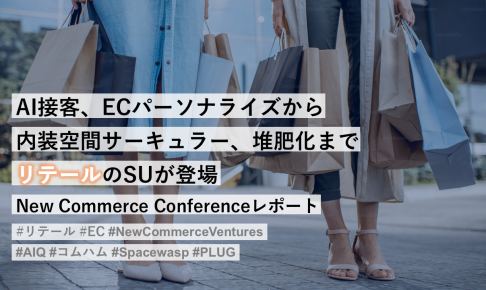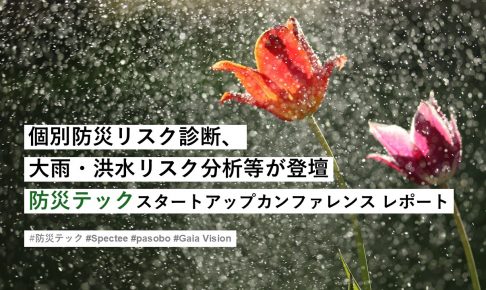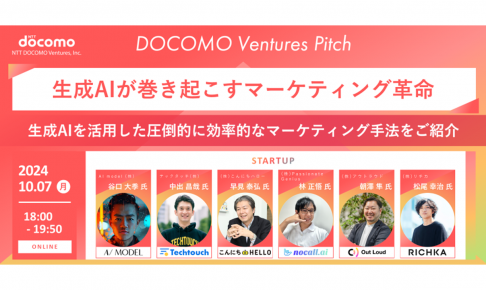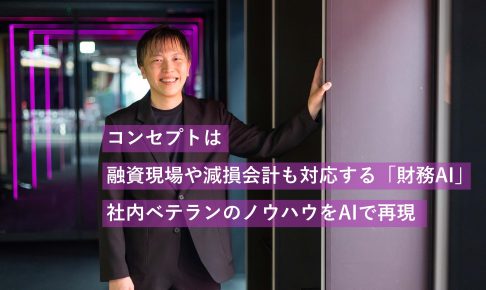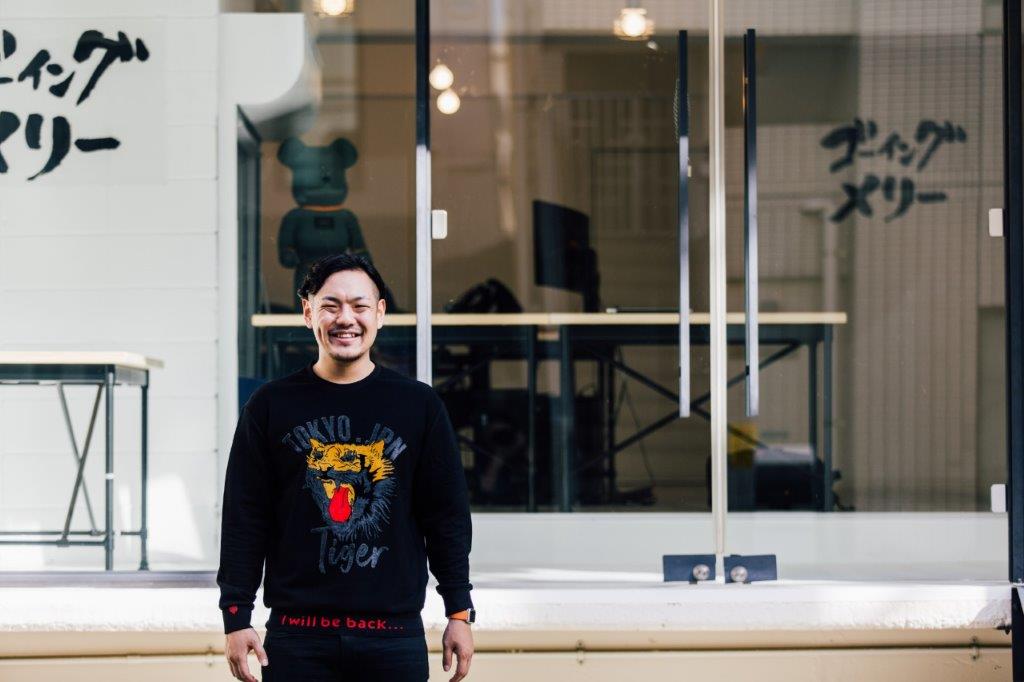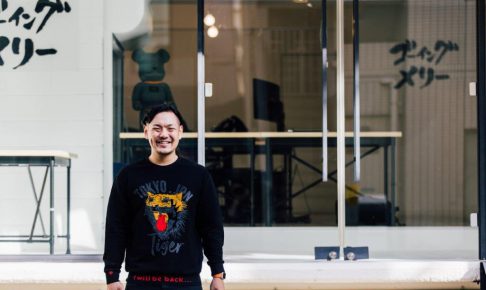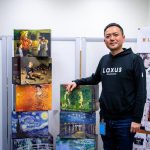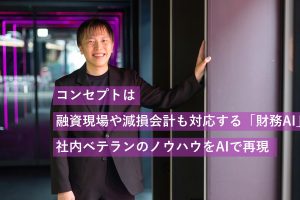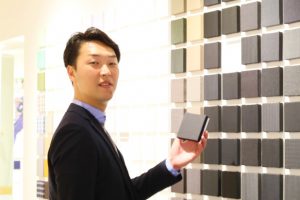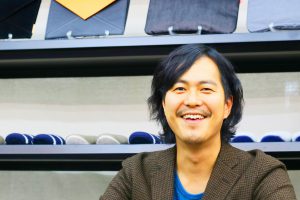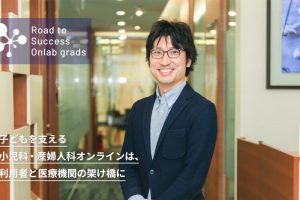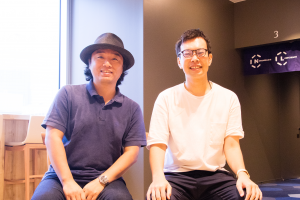日本でも珍しくなくなった「Direct to Consumer(以下「DTC」)」(編注:コンセンサスのとれた定義は未だ存在しないと思われるが、本稿ではDTCを広義に捉え「コンセプトを明確にした、スマホ時代のブランド」とする)。
最近では鈴木えみ氏がAmazonのインフルエンサー・ファッションブランド・プロジェクト「THE DROP」へ参加したり、小嶋陽菜氏がファッションブランド「Her lip to」を手がけたりと、芸能人・有名人がオリジナルブランドを作る例も出てきた。
とはいえ、テレビなどのマスメディアで名の知れた有名人・芸能人がブランドを作ること自体は昔から行われてきたことで、珍しいものではない。彼女らほど影響力があればファッションブランドも作れるのかもしれないが、もっと影響力が小さなインフルエンサーがブランドをもつことは難しかった。そう、今までなら。
近年様子が異なるのは、芸能人ほど有名とは言えないものの、特定の層に熱烈なファンがおり、影響力のある「インフルエンサー」が(DTC)ブランドを作りあげていることだ。しかし彼女らは必ずしもブランドやファッションのスペシャリストではない。そんなブランドが売れるのか? と疑問に思うかもしれないが、売れる例も出てきた。例えばエイミー イストワールやアメリ・ヴィンテージは共に年商30億円を超えると報道されている。
そんなインフルエンサー・ブランドの隆盛の兆しが見えてきた2019年10月、人気インフルエンサーによる5つのファッションブランドがpicki(ピッキー)株式会社(以下「picki」)からリリースされた。pickiはファッションのプロでないインフルエンサーのブランドを、インフルエンサーの原体験を紐解きながら作り上げるファッションD2Cプラットフォームだ。
「インフルエンサーブランドのロールモデル、ひいてはクリエイターの新しいカルチャーを作りたい」と語るpicki代表の鈴木氏に話を聞いた。
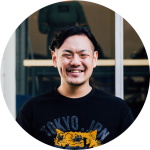 picki株式会社 代表取締役 CEO 鈴木 昭広(Suzuki Akihiro)
picki株式会社 代表取締役 CEO 鈴木 昭広(Suzuki Akihiro)
日本で高校卒業後、韓国、アメリカ、中国留学など10年間海外在住を経て2010年に韓国でアパレルOEM会社を起業。2013年に東京でアパレルODM会社を起業。2015年に世界50カ国以上のビジネス視察。2017年に東京でDecoro株式会社を創業。
インフルエンサーはポジションを取る
pickiのサービスを語る上では、鈴木氏の経歴を紐解くことが肝要だ。
鈴木氏は高校卒業後から10年ほど、韓国、アメリカ、中国と海外生活を送る。母親が韓国籍でアパレルのOEM・ODMを運営していたこともあり、最初は韓国で起業。日本のアパレル企業からアパレルのOEM・ODM生産を請け負っていた。会社は当初こそ好調だったものの、日韓関係に伴うマクロ経済的な事情もあり業績が悪化し、解散した。次は日本で起業することにした。だがその前に鈴木氏は「自分の強みはグローバルだから」と、1年半で50ヵ国、特にシリコンバレーやニューヨーク、テルアビブ、パリ、ベルリンなどITビジネスに強い国々に、ビジネスの種を探す旅へと出る。
鈴木氏が旅していた当時、日本のスタートアップはキュレーションなどメディアビジネスの全盛期。鈴木氏もメディア関連での起業を考えていたが、海外の状況を見ていると「これからはコンテンツを作る側の人間が重要」と思い直す。同時期アメリカでは、Warby ParkerやEverlaneといった、いわゆるDTCが人気を博し始めた時期だ。DTCを視察した鈴木氏は、疑念と希望を見出す。
DTCが人気だというので、店舗に行って商品を見てみたんです。自分がモノをつくっていたこともあって、正直最初は「大したことないな」って感じたんですよ(笑)。ただお客さんはひっきりなしに来ている。様子を見ていたら、どうやら「DTCだから」といって買っている人はいない。お客さんが買っていたのは体験。UXを買いに来ているんだと思いました。個人のエンパワーメントにも昔から興味があったので、それと体験を組み合わせたら面白い。この考えがpickiの原型になりました。(鈴木氏、以下同様)
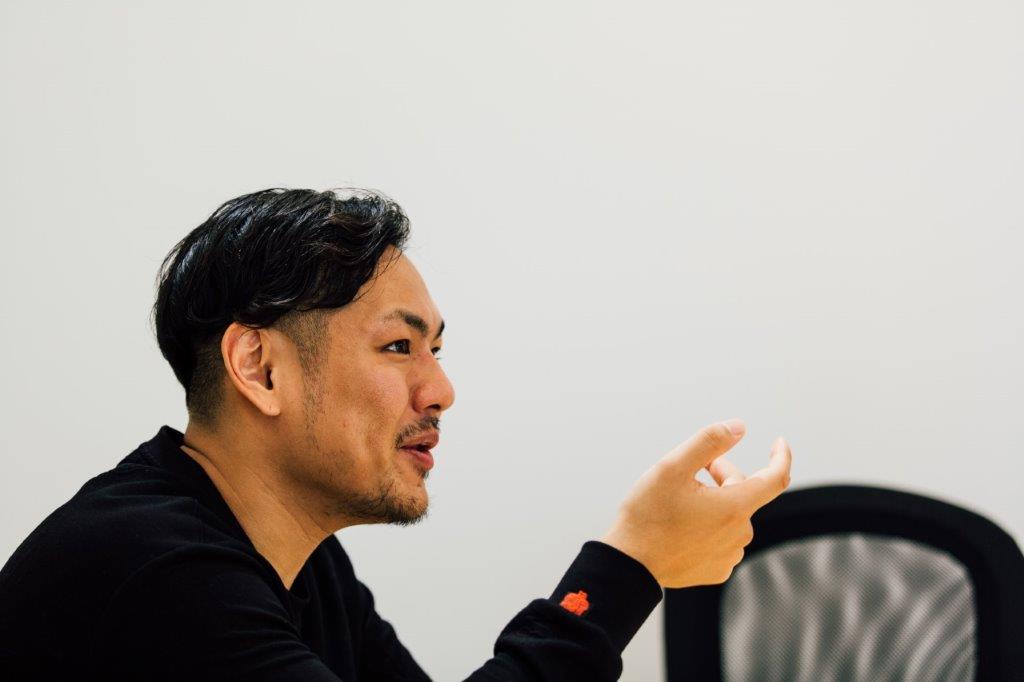
個人のエンパワーメントとして見逃せないのが、YouTuberやInstagramerなどの、いわゆる「インフルエンサー」だ。DTCという言葉が登場し始めたのと同時期に、インフルエンサーも脚光を浴び始めている。
鈴木氏に言わせれば、インフルエンサーの特徴は「ポジションを取ること」だ。逆に言えば、一般の人はポジションを取れないのだと鈴木氏は語る。幼少期からスマホをもってSNSで友達と繋がる現代において、言動や行動は筒抜けになる。過激な発言や目立つ行動は消せない過去となって個人に纏わりつき、その結果多くの人はリスクを取れなくなり、極端なポジションを取る人は、良くも悪くも人々の耳目を集めてしまう。
逆に捉えれば、リスクを取って言い切る人たちの周りに人が集まるのが現代のコミュニティの構造なのかもしれない。そしてポジションを取って「これが好き」「自分はこれがかっこいいと思っている」と声を上げられる人がインフルエンサーと呼ばれるようになってきた。
「好き」を中心にできたコミュニティの中心のインフルエンサーが、モノを作って売る。こんな構図がワークするんじゃないかなと思いました。
さてインフルエンサーは影響力をもつにつれ、だんだんとマネタイズ活動にチャレンジするようになる。その最たる手段がPR投稿だ。インフルエンサーが企業の商品を宣伝する代わりに、当該企業から金銭を授受。もちろんそれ自体は正当な行為だが、PR表記・ステマ問題や、必ずしも紹介できる案件が来るとは限らないこと(インフルエンサーだって何でも紹介してくれるわけではない)、事務所に所属していたりしなければ案件を自分で切り盛りしなくてはいけない、などの理由から限界も見えてくる。
そこで登場してくるのが、インフルエンサー自らによるブランドの立ち上げだ。元々ポジションを取れるようなこだわりがあるインフルエンサーだからこそ既存のファッションに満足していないことも多く、オリジナルブランド製作に興味をもつ。
ブランドではインフルエンサーが考える世界観を、アパレル等のアイテムで表現する必要がある。とはいえインフルエンサーは、アパレルのプロではない。自分でアパレルを作ろうと思ってもクラスTシャツのようなアイテムを作るのが関の山。「それではブランドというか、ファングッズ。ブランドはもっとコンセプトをはっきりさせて、それを表現したものであるべき」(鈴木氏)。そこで登場するのがpickiのような「ファッションD2Cプラットフォーム」だ。
原体験からストーリーを、ストーリーからUXを
pickiは、ファッション分野で活躍するインフルエンサーが、オリジナルブランド立ち上げるためのD2Cプラットフォームサービス。pickiがこれまでOEM等で培ったアパレル製作のノウハウを活かし、インフルエンサーのブランド立ち上げから、商品企画、生産、販売、物流までをトータルで支援する。pickiでアイテムを作るのは「こだわりが強く、世界観がある」インフルエンサーだ。
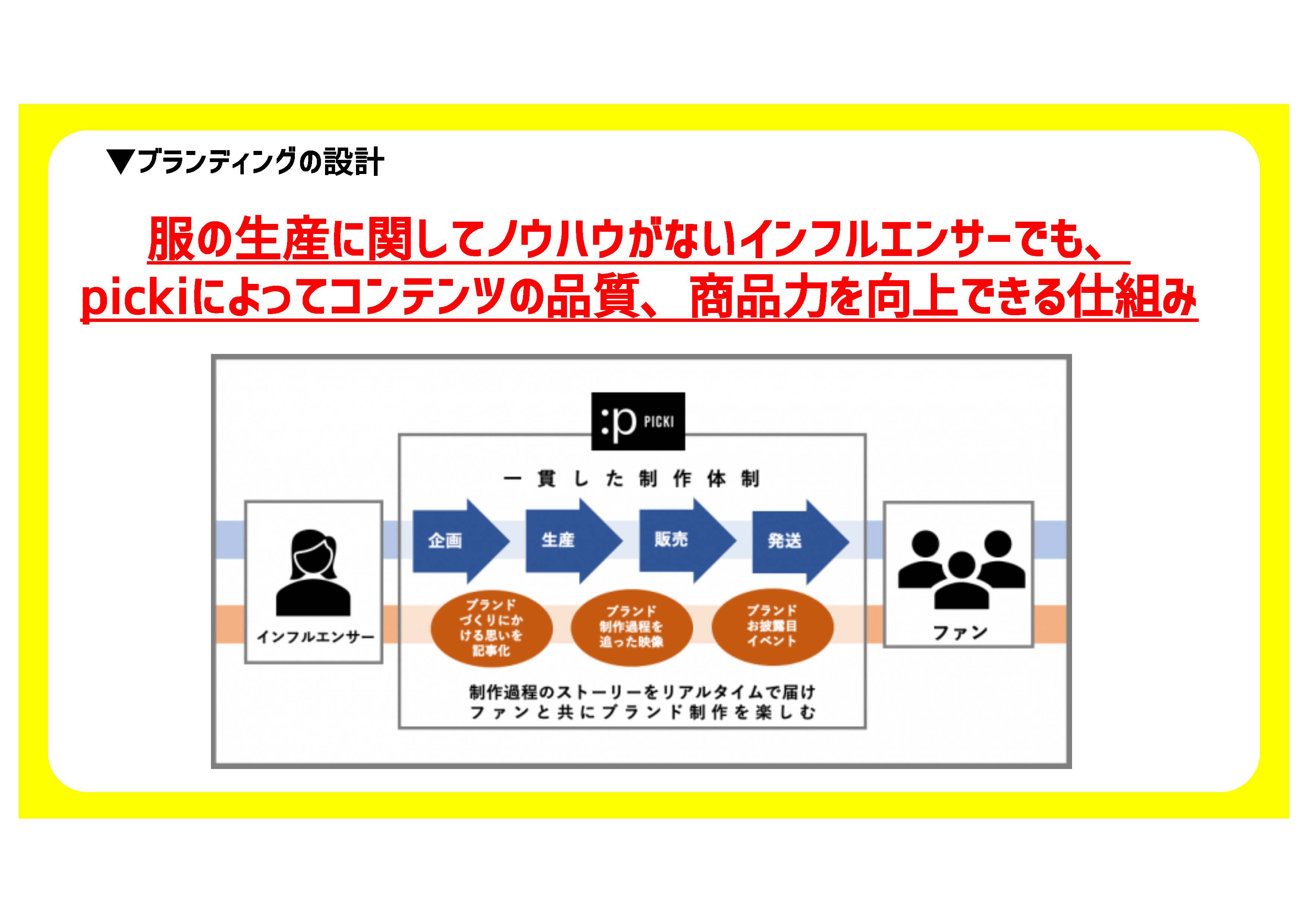
(image: picki)
アイテムを作るに際してはまず企画だ。アパレルを製造するためにはパターン、生地、仕様書などが必要だが、インフルエンサーの世界観をデザイナーが形作るところから始まる。世界観を形作るとはつまり、マーケットインではなくプロダクトアウトでアイテムを作っていくということだ。
forever21が破産申請をしたことに代表されるように、ファッション業界は全体として低調。そんな中ファッション各社は「売れる製品」を作るために、「売れている製品」を参考にし、その結果巷には似たような製品ばかりが売られているという状況を作ってきた。マーケットイン思考になることで、ファッションのコモディティ化が進んでいるのだ。しかしpickiはその流れに一石を投じる。
pickiではブランドを作りはじめるときにかなりの工数を使い、インフルエンサーに原体験を聞いていく。なぜその洋服が作りたいのかを深堀りするのだ。「あなたが生まれた最初の記憶は?」に始まり、そのうち原体験が出てくる。そこからブランドのコンセプトを固め、だからこういうブランドにしよう、というプロセスを、すべてのインフルエンサーが踏む。即ちアイデンティティを表現するために、自分を曝け出す作業をしているのだ。

企画が終われば次は生産だ。pickiでブランドを作るインフルエンサーのフォロワーは数万人なので、決してマスといえるような経済圏をもっているわけではない。そのため1着のロットは数百枚程度。個別に職人が作っては原価が上がってしまう。
かといって原価が2000円の商品を100枚作って20万円という規模は、工場としては小さすぎておいしい取引ではない。一つひとつのブランドが個別に工場と交渉しても、引き受けてくれる工場を見つけるのは難しい。その点pickiなら工場での生産が可能だ。
前掲の通り鈴木氏は元々OEM会社を経営。picki社においても当事業を継続している。大きな案件をOEMとして受注し、海外の工場に製造を依頼。その間隙を縫ってインフルエンサーブランドの商品を製造しているのだ。大きな案件がセットになっているため工場としても、「ついでに」生産ができる。とはいえpickiは現在数ブランドしか扱っていないものの、将来的にブランド数が増えれば工場としても案件を受注しやすくなっていくはずだ。
商品ができたら、販売・物流だ。物流はOPENLOGI(オープンロジ)などのサービスを使いつかいつつ運営。DTCということもあって直接的な販売方法は自社ECなのだが、特徴的なのは企画から製造までのフローのコンテンツ化だ。
既存の洋服は体験ではなく、製品の質が評価されてきた。そこにあるのは「かわいい/かわいくない」「高い/安い」という価値観だ。ところが近年のDTCブランドは「体験」を重視。そこではプロセスやストーリーが大事に扱われる。
自分の好きなインフルエンサーが原体験を語り、そこから企画を紡ぎ、洋服を生産していく。もちろん商品そのものも欲しいとは思いますが、作るまでの過程を知ることが、ユーザにとってはかけがいのない体験となります。
なのでpickiでは生産過程をストーリーにして、記事や動画にして露出していく。プロセス自体がコンテンツになって、エンターテインメントになって、ユーザを巻き込む。だからインフルエンサーブランドって売る前から売れるんです。
商品を作っていく様子のコンテンツ化は、先述したこだわりを持つインフルエンサーだけがpickiに登場するという文脈とも整合する。ストーリーで売っていこうと言っているのに世界観がなく「売れそうだから作りました」となったら、コンテンツとして成り立たないのだ。
コンテンツはpicki上のオウンドメディアで掲載し、同時にブランドのSNSアカウントも制作し、情報発信。ファンとインタラクティブにコミュニケーションをとり、ファンを巻き込んで、ストーリーをセットにして商品販売へと繋げていく。
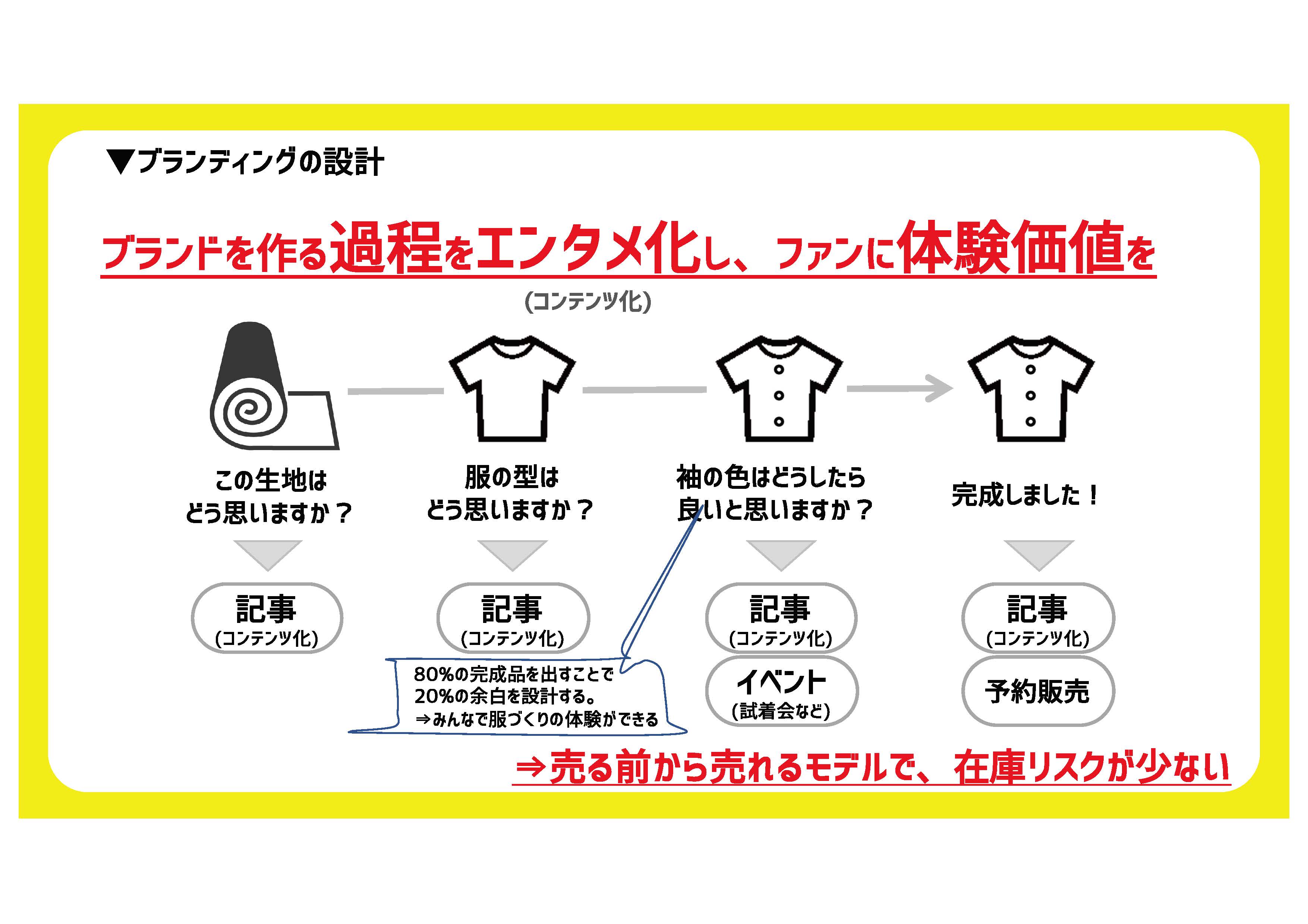
(image: picki)
ストーリーをUXに昇華させるためには、ストーリーの対象を一気通貫で見届ける必要がある。しかしファッション業界は長い年月をかけて、そのプロセスを高度に分業化してきた(もちろんそれが悪いわけではない)。そのため1つのブランドに横軸を通して紹介することは難しかった。しかしpickiは社内にデザイナーやMD、生産管理、ライター、動画クリエイターなど多様な人材を抱え、生産プロセスや情報配信を一手に担い、UXを作り上げていく。
インフルエンサーブランドのロールモデルをつくる
pickiは2019年10月、5つのインフルエンサーブランドのリリースを発表した。
例えば中川友里氏は「bpm150」というブランドを展開。彼女はAmazonプライム・ビデオにて配信されている恋愛リアリティ番組「バチェラー・ジャパン」にも出演していたインフルエンサーだ。指に「FASHION」とタトゥーを入れるほどのファッション好きで、こだわりが強く「ポジションやリスクを取れる人」だというから、pickiの登場を飾るにはうってつけの人材である。ちなみに「bpm150」とは心拍数150(ちょっときつめの運動をするくらい)のことで「羽織るだけでBPMが150になるような、胸が高まるブランドをつくる」といった意図が込められているという。中川氏がBPM150のアイテムを作っていく過程はこちらで公開されている。
またインフルエンサーと言っても、ファッション関連のインフルエンサーだけがアイテムを作るわけではない。佐々木ののか氏は文筆家でコアなファンが付いているインフルエンサーだが、「文章を文章以外で表現したい」と考え、pickiでブランド「あなた」を作るに至ったという。
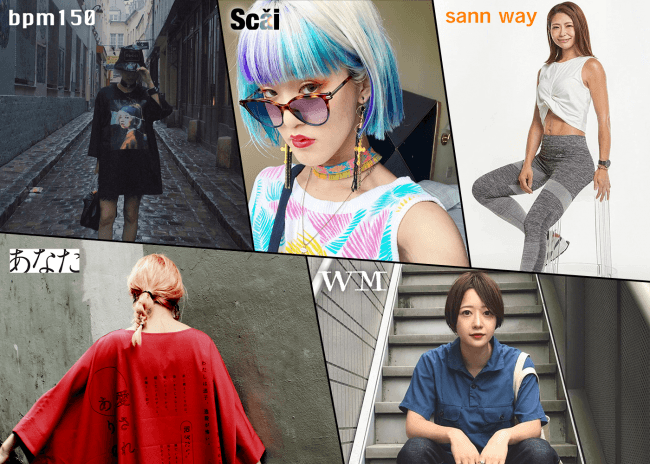
(image: picki)
pickiとしては、第1弾に登場した5つのブランドや後続のブランドから「ブランドを作って稼ぐインフルエンサーのロールモデル作りたい」という想いが強いようだ。
YouTuberが動画を作って稼ぐことが当たり前になった背景には、有名YouTuberの登場が挙げられる。彼らがロールモデルとなり裾野を広げたからこそ、後続のYouTuberが続々と誕生した。同じ様にブランドを作って稼ぐインフルエンサーのロールモデルが誕生すれば、インフルエンサーがブランドを作ることは普通になるし、何ならブランドを作るためにインフルエンサーになるという人も登場するかもしれない。
実際pickiからロールモデルが誕生する萌芽もみてとれる。前述した5ブランドはもちろん、きゃりーぱみゅぱみゅなどが所属する事務所ASOBISYSTEMに所属するモデル瀬戸あゆみ氏(Instagramのフォロワーは28万人いる)が、pickiで「Sisterhood Tokyo」というブランドの製作開始を発表。2020年春のリリースに向けて現在準備中だ。ブランド立ち上げに際して「新しいブランドは『picki株式会社』という新しい会社と一緒に立ち上げることになりました」(原文ママ)と公言。pickiが単に洋服を作るだけの請負業者ではないことが窺える。
彼女は以前にもブランドを立ち上げており、そのクローズと新ブランドの立ち上げを同時に発表。Instagramのコメントには熱意のこもった長文のメッセージが何十件と来ているそう(100件以上のDMも来ていたという)。
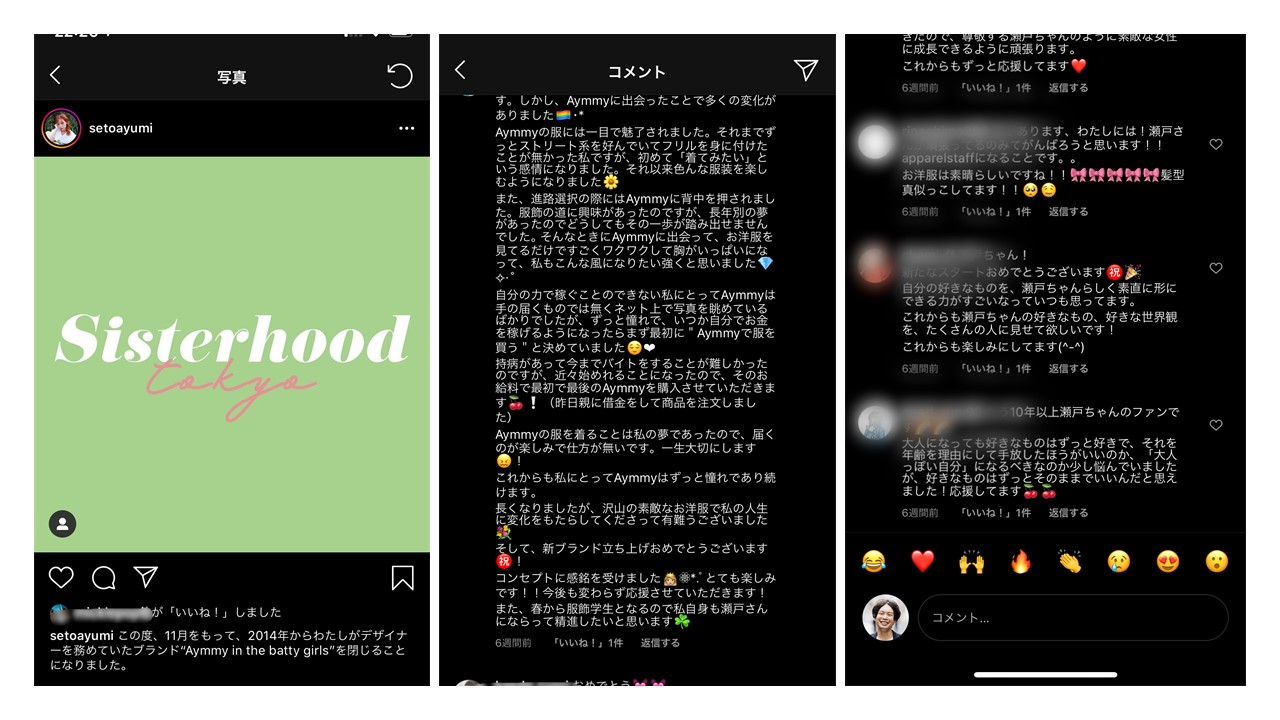
(瀬戸氏のInstagramよりpilot boat作成)
彼女のようなインフルエンサーがpickiでアイテムを作り有名になってロールモデルとなれば、他のインフルエンサーが追随することは十分にありえるだろう。
瀬戸さんがpickiで新しいブランドを始めるにあたって、ブログを公開しています。これ自体は直接pickiのコンテンツではありませんが、ブランドへの想いなどを語っていて、それに対してファンの方々がすごく暖かく反応している。単にブランドを作りました、だけではこの反応はありません。これをみてpickiのやっていることは間違いじゃないなと感じましたし、ロールモデルにすべく、お手伝いしたいとの想いも強まりました。
現代において洋服は溢流(いつりゅう)している。クローゼットには洋服が溢れているし、ZOZOTOWNや各社のECを訪れれば大抵の洋服は見つけられる。
だからといって消費者のニーズが満たされているわけではない。大手アパレルによる「売れる商品」を真似した商品開発が進めたファッションのコモディティ化は逆に、「人と違った洋服がが欲しい」というニーズを生み出している。
そこにインフルエンサーが独自の世界観を纏ったブランドを作れれば、消費者の期待に応えられるだろう。インフルエンサーに共感を覚えるフォロワーは、インフルエンサーの想いが発露されたコンテンツでさらに共感し、作られたアイテムに興味を抱くようになる。
pickiは創業時から、クリエーターが作りたいものを作って、買いたい人たちが集まるような場やカルチャーを作りたいと語ってきました。
カルチャーを作るには、目指すところがあるという状態がいいと思っています。例えばアーティストが武道館を目指すような。ファッションだと東京コレクションや東京ガールズコレクションなんかが思い浮かびますけど、ちょっと遠い。もっと身近な「目指すところ」にpickiをしていきたい。そのためにもpickiに今あるブランドをひとつずつ、成功させていきたいですね。
—
アパレルブランドにおいては数十億円ならいざ知れず、年商5千万円~1億円程度のブランドを作ることは、格別に難しいわけではないと鈴木氏は語る。しかしそこから数%マネタイズできれば、インフルエンサーにとっては大きな収入源だ。
かといってインフルエンサーがノウハウなしにブランドを作ることは、リスクを孕む。あるインフルエンサーは、オリジナルで商品を作らず海外から買付け。ブランド名だけ付け替えて販売していたことが問題視され、炎上騒ぎに発展した。そこまでいかなくても、オリジナルのアイテムを作るには、それなりの知識が必要。ここにpickiのようなDTCプラットフォームのチャンスがあるというわけだ。
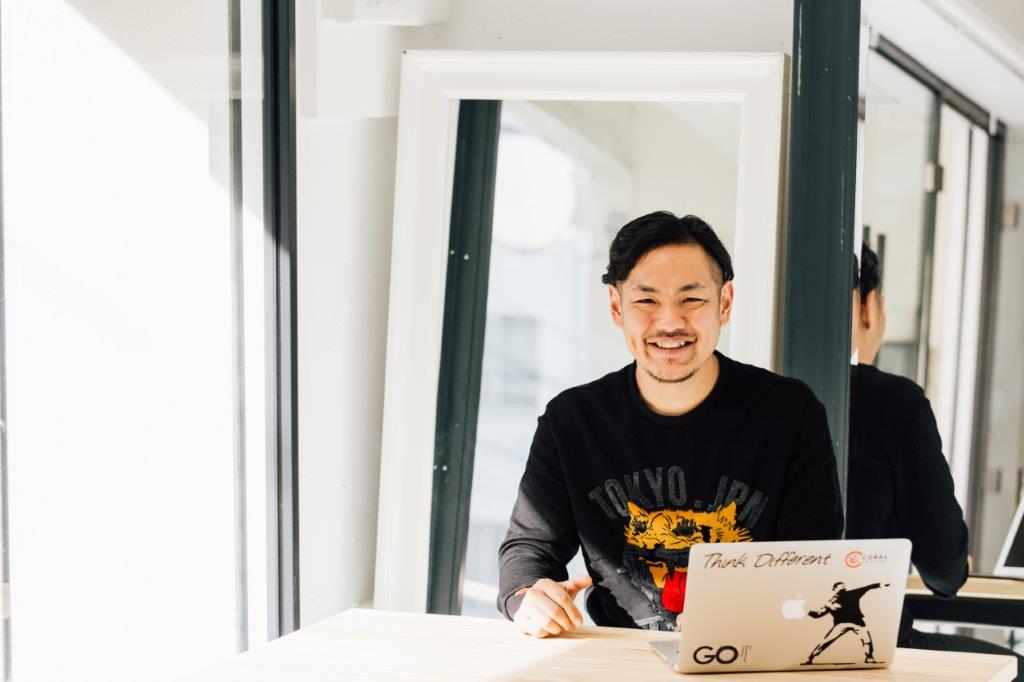
誤解を恐れず言えば、pickiはインフルエンサーブランドの企画から販売までを、何セットも繰り返している。ブランドによってコンセプトやコンテンツは違っても、裏側でやるこは同じだ。ということは、ブランドを積み重ねれば積み重ねるほどノウハウが溜まり、どんどんビジネスとしての効率が上がってくる。生産量が増えればボリュームディスカウントができるかもしれないし、物流も効率がよくなるかもしれない。データが溜まればブランド間の相互集客ができるかもしれないし、商品の売れ行きが予測しやすくなる可能性もある。こうしたナレッジがまたブランドに還元できる資産となっていく。
今後もpickiには新しいブランドが登場してくる予定だ。その中から「ブランドを作って稼ぐロールモデル」が登場し、さらにブランドが増えるという循環を、ぜひ生み出して欲しい。
会社名:picki株式会社
代表者:代表取締役 鈴木 昭広(Suzuki Akihiro)
所在地:東京
設立日:2017年5月
URL :https://picki.jp/
※情報は記事公開時点のものです。
インタビュー内容はpodcastでも配信しています
podcastで取材時のインタビューを配信しています。
制作チーム
TEXT
ぺーたろー / 納富 隼平(Notomi Jumpei)
合同会社pilot boat 代表社員CEO
1987年生まれ。明治大学経営学部卒、早稲田大学大学院会計研究科修了。在学中公認会計士試験合格。大手監査法人で会計監査に携わった後、ベンチャー支援会社に参画し、300超のピッチ・イベントをプロデュース。 2017年に独立して合同会社pilot boatを設立し、引き続きベンチャー支援に従事。長文でスタートアップを紹介する自社メディア「pilot boat」、toCベンチャープレゼンイベント「sprout」、その他スタートアップイベントを運営。得意分野はファッション・ビューティ×テクノロジーをはじめとするライフスタイル・カルチャー系toCサービス。各種メディアでスタートアップやイノベーション関連のライター、大手企業向けオープンイノベーション・コンサルティングも務める。
Twitter: @jumpei_notomi
PHOTO
森田大翔(TAISHO)
写真家/映像作家
【写真】 雑誌やWeb広告など、人物を中心に撮影。イベント撮影や企業様の採用写真(Wantedlyなど)も多く撮影。
【映像】 企業様を対象にしたドキュメンタリー映像やメイキング映像が多く、ドローンを使用した撮影も可能。(CM撮影など)
【受賞歴】 “The new generation digital photo contest 2013” 最優秀賞受賞
記事配信時に、LINE@でお知らせしています。記事更新の連絡が欲しい方は、LINE@のフォローをお願いします。


